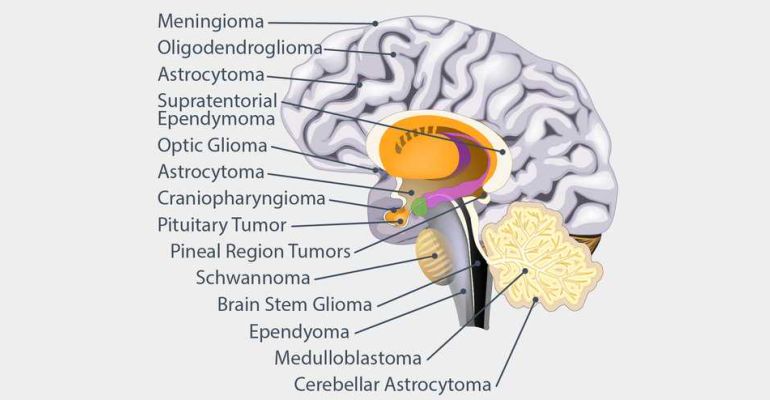BRAIN TUMOR
A cancerous or non-cancerous mass or growth of abnormal cells in the brain.
Tumors can start in the brain, or cancer elsewhere in the body can spread to the brain. The risk for most types of brain tumors increases with age. Symptoms include new or increasingly strong headaches, blurred vision, weakness of limbs, loss of balance, confusion and seizures. In some cases, there may be no symptoms.
Treatments include surgery, radiation and chemotherapy. Brain Tumor locations are:

Symptoms and Signs such as:
• Headaches, which may be severe and worsen with activity or in the early morning
• Seizures, People may experience different types of seizures. Certain drugs can help prevent or control them
• Personality or memory changes
• Nausea or vomiting
• Fatigue
• Drowsiness
• Sleep problems
• Memory problems
• Changes, inability to walk or perform daily activities
Types of Brain Tumor
There are many types of glioma. Some grow slowly (Low grade) and aren't considered to be cancers. Others are considered cancerous (High grade). Another word for cancerous is malignant. Malignant gliomas grow quickly and can invade healthy brain tissue. Some types of glioma happen mostly in adults. Others happen mostly in kids.
For more details please book your appointment with our Neuro-oncology expert Neurosurgery doctor in Mumbai.
For more details, treatment options and prognosis please consult our Best brain tumor expert best neurosurgeon in Ghatkopar, Mumbai..
For more details, treatment options and prognosis please consult our Best brain tumor surgeon in Andheri, Mumbai
Oligodendroglioma often contain hemorrhages, cysts, or calcifications which can be found on CT scans as well as MRIs. This type of glioma can occur in the temporal lobe or frontal lobe. Symptoms will depend on the type and location but may include seizures and headaches, and problems with movement and balance.
For more details, treatment options and prognosis please consult our Best Neurooncologist in Mumbai.
Medulloblastoma can happen at any age, but most often occurs in young children. Though medulloblastoma is rare, it's the most common cancerous brain tumor in children.
Signs and symptoms of medulloblastoma may include, Dizziness, Double vision, Headaches, Nausea, Poor coordination, Tiredness, Unsteady walk, Vomiting. CTs and MRIs to show the size and location of the tumor.
Treatment for medulloblastoma usually includes surgery followed by radiation or chemotherapy, or both.
For further details regarding treatment options and prognosis please consult our Best paediatric neurosurgeon in Andheri, Mumbai.
Healthcare providers rate ependymomas on a 1 to 3 grading scale, with grade 1 tumors growing the slowest and grade 3 tumors growing the fastest.
Ependymoma symptoms vary depending on the tumor location and size and your age. CTs and MRIs demonstrates these tumors.Treatment options for ependymoma includes surgery, radiation, chemotherapy, immunotherapy, and targeted therapy.
For more information about ependymoma please consult our Best neurosurgery doctor in Ghatkopar, Mumbai.
For more information about central neurocytoma please consult our Best neurosurgeon in Vikhroli, Mumbai.
For more information about Choroid plexus papilloma please consult our Best neurosurgeon in Mulund, Mumbai.
The pituitary gland is in the skull, below the brain and above the nasal passages. A large tumour can press upon and damage the brain and nerves.
Vision disturbance or headaches are usually presenting symptoms. In some cases, hormones can also be affected, interfering with menstrual cycles, and causing sexual dysfunction. Based on different hormonal irregularities, symptoms may differ. MRI, CT scan and hormonal assay helps in diagnosing the problem.
Treatments include surgery and medication to block excess hormone production or shrink the tumour. In some cases, radiation may also be used.
For more information about pituitary adenoma please consult our Best neurosurgeon specializing in endoscopic skull base surgery and pituitary surgery in Mumbai.
Your neurosurgeon and endocrinologist (hormone disorder specialist) will work together to develop the optimal treatment plan for you. Treatment for a craniopharyngioma (or other brain tumor) may include the surgical removal of the tumor through a procedure called a craniotomy or endoscopic surgery.
For more information about craniopharyngioma please consult our team of Best neurosurgery doctor and endocrinologist in Mumbai.
